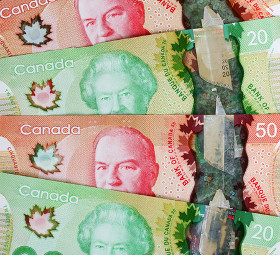
The Canadian dollar is looking for direction on Monday after the government reported better-than-expected inflation numbers. Investors will now look ahead to retail sales data later this week, as well as keep a close eye on the US central bank headâs annual speech at Jackson Hole.
On Friday, Statistics Canada reported that the July consumer price index (CPI) advanced 3.0%, beating market forecasts of 2.5%. The government agency further noted that the Core CPI climbed 1.5%, also beating initial projections of 1.3%. Analysts were disappointed when it was determined the Core CPI reading was below the Bank of Canada (BOC)âs 3% range.
Canadian retail sales data for July will be announced on Wednesday. Financial experts do think that it will be 1.1%, much lower than Mayâs impressive gain of 2.0%. That said, anything weaker than the market forecast could send the loonie lower.
Without any significant economic reports coming out this week, either in Canada or the US, investors will pay attention to Federal Reserve Chair Jerome Powellâs speech on Friday in Jackson Hole. The annual event could shed light on the central bankâs pace of increasing interest rates. Right now, the market is penciling in a rate hike in September and in December.
The Canadian dollar did gain some support from rising energy prices. September West Texas Intermediate (WTI) crude oil futures tacked on $0.33, or 0.50%, to $66.29 per barrel on the New York Mercantile Exchange.
While the general consensus is that the worst of the financial and currency crisis in Turkey is over, investors are still playing it safe. Many traders are diving into the US dollar, which has been viewed as a safe haven asset in recent months. The greenback took a breather as the US Dollar Index slipped 0.18% to 95.96.
In other geopolitical developments, US and Chinese officials will hold trade talks this week. The negotiations could extend clues to whether the worldâs two largest economies will ease tensions or escalate trade spats. This is important for Canada because it exports many commodities and maintains a current account deficit, so if capital slows or the flow of trade is impacted, then its economy might contract.
The USD/CAD currency pair jumped 0.02% to 1.3063, from an opening of 1.3062, at 17:38 GMT on Monday. It has been a different story for the EUR/CAD as the currency pair rose 0.21% to 1.4970, from an opening of 1.4939.
If you have any questions, comments or opinions regarding the Canadian Dollar,
feel free to post them using the commentary form below.